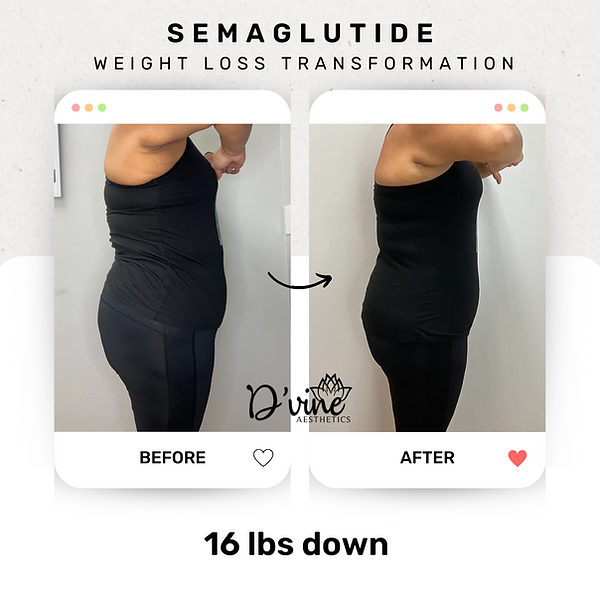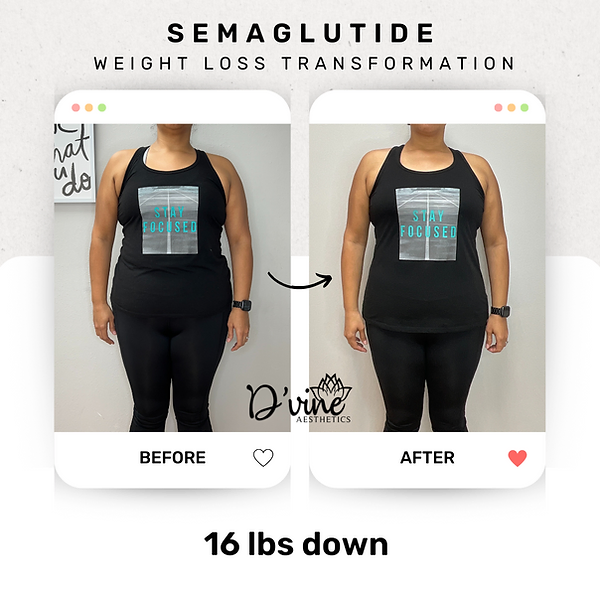These medications are used to treat Obesity (BMI >30).
They work by stimulating the pancreas to produce additional insulin.
Increase the stomach’s emptying time
Signal the brain with a feeling of fullness
Produces powerful and lasting appetite suppression
Protects you against cardiovascular disease
Decreases cravings
Non-stimulant
It is important that you follow a diet and exercise plan along with the weight loss protocol.

Personal or family history of medullary thyroid carcinoma or Multiple Endocrine Neoplasia syndrome type 2
Pregnant or breast feeding
Diabetic, please contact your doctor
History of pancreatitis or severe alcohol abuse
High triglycerides
Renal impairment
M.I.C Lipotropics:
Methionine: Sulfur-containing amino acids. Helps break down sugars & carbohydrates and convert to energy.
Inositol: aids in the metabolism of fats and helps reduce blood cholesterol. Converts food to energy
Choline: support the health of the liver in its processing and excretion of chemical waste products within the body. It it is required for the transport of metabolism of fats and cholesterol, which is important for support of nerve cells, the endocrine, cardiovascular and hepatic system. Cuts muscle recovery time, helps convert fat to energy .
L-Leucine:Triggers reduction in calorie intake, causing a drop in in-between meal snacking and increasing energy
L-Carnitine: a natural occurring amino acid. Building block for proteins, helps body burn fat as fuel. Improves fat metabolism and energy, reduces recovery times and promotes muscle building potential
B12 Methylcobalamin: Most bioavailable B12 form. Increases energy and metabolism; also plays a vital role in fatty acid synthesis and energy production: an energy booster and it is among the most important of all the B-complex vitamins. Main functions are in the formation of red blood cells and the maintenance of a healthy nervous system. Helps with the metabolism of fats and carbohydrates. It also helps the growth of healthy blood cells, never cells, and proteins in the body.
B-Complex: Helps convert fat, food and carbohydrates into energy, increases metabolism and supports immune function.
B1 Thiamine: aids in appetite regulation while helping to convert fat and carbohydrates into energy
B2 Riboflavin: increases metabolism, helps release energy from carbs and breaks down fats, turning them into energy
B3 Niacinamide: promotes proper brain function, necessary for healthy muscle tissue, anti-inflammatory properties
B5 Dexpanthenol: converts food into energy, helps maintain healthy digestion and reduces bad cholesterol
B6 Pyridoxine: promotes red blood cell production and converts food to energy.
Typical B12 dose: 1mL IM 1-3 times a week. Multiple injections will be required to achieve optimal results. How many you need will depend on your age, activity level, physical health, frequency of injections, and how well your body responds to the treatment.
Side Effects
A vitamin B12 shot is safe and generally has no negative side effects, even in higher doses. Some redness and/or swelling at the injection site may occur as with any injection. In rare cases, B12 can cause diarrhea, peripheral vascular thrombosis, itching, rash, hives
Contraindications
Sensitivity to cobalt and/or cobalamin Chronic liver and/or kidney dysfunction Patients on Chloramphenicol (antibiotic) can block the red blood cell producing properties of B12. Drugs that decrease or reduce the natural absorption of B12: antibiotics, cobalt irradiation, colchicine, colestipol, H2-blockers, metformin, nicotine, birth control pills, potassium chloride, proton pump inhibitors such as Prevacid, Losec, Aciphex, Pantaloc, and Zidovudine. Contraindicated in Leber’s disease, a hereditary optic nerve atrophic condition.

